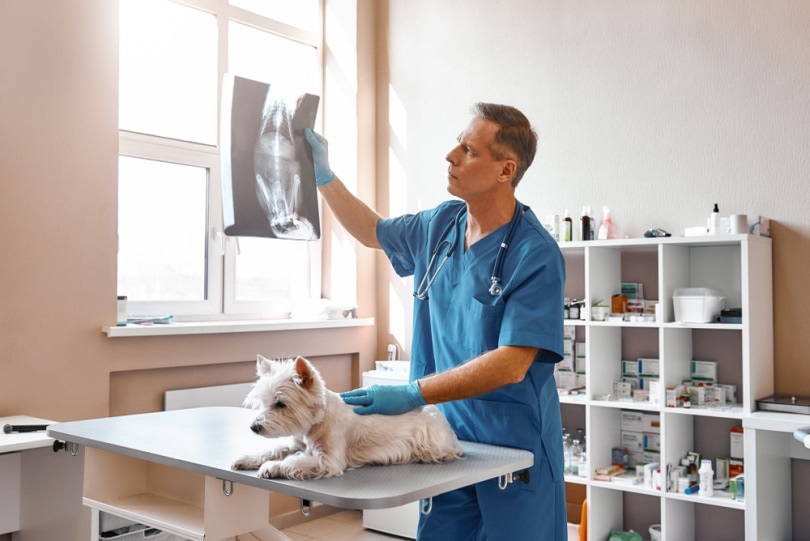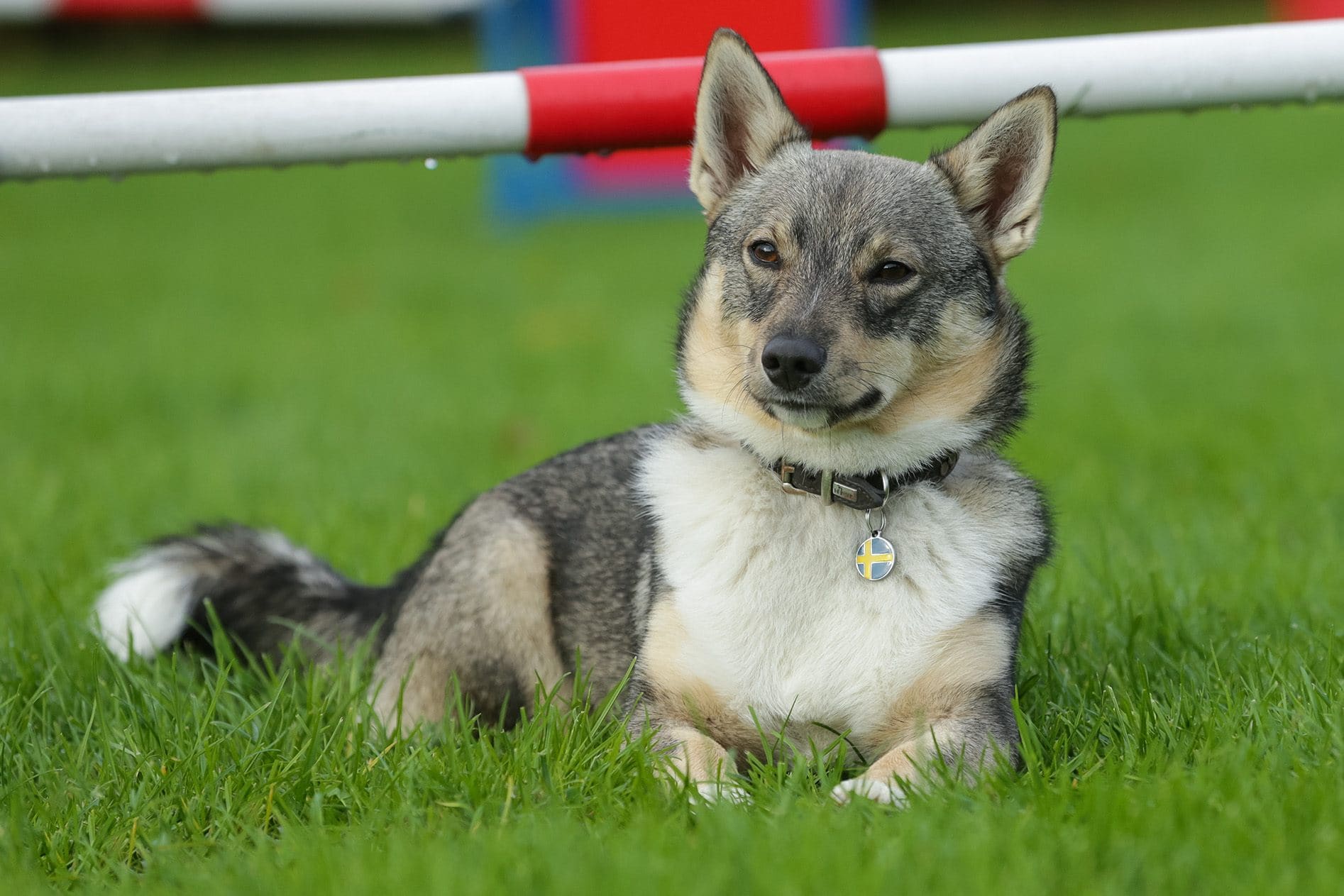Female vs Male Rhodesian Ridgeback: Main Differences
By Kit Copson
Updated on

Tall, lean, elegant, and athletic, the Rhodesian Ridgeback is a canine you can’t help but notice. When you get to know them, it quickly becomes apparent that these dogs, in spite of possessing a hint of willfulness and an independent streak, are incredibly affectionate family dogs, but is there a difference between male and female Rhodesian Ridgebacks?
Temperament-wise, we can make generalizations based on the experiences of breeders and owners, but a dog’s personality isn’t typically linked to whether they’re male or female—each dog has their own character.
In this post, we’ll explore what breeders have to say about the difference between males and females, and look into physical and behavioral differences you might spot in unspayed or unneutered dogs.
Visual Differences

At a Glance
- Average height (adult): 25–27 inches
- Average weight (adult): 85 pounds
- Average height (adult): 24–26 inches
- Average weight (adult): 70 pounds
Rhodesian Ridgebacks 101
The Rhodesian Ridgeback originated in South Africa, where the breed was created by mixing a wide variety of other breeds, including the Khoikhoi dog (a native South African breed), Greyhound, Great Danes, Bloodhounds, Mastiffs, and Terriers.
Males are slightly taller than females, and are heavier by, on average, around 15 pounds. Rhodesian Ridgebacks come in a number of colors, including various wheaten shades, and have an athletic and muscular yet slender build with a tightly tucked-in waist. The coat is short and sleek.
The legs are long, slim, and elegant, which contributes to the Rhodesian Ridgeback’s famously proud, dignified stance and gait. The head is long with a flat skull and a wide space between the ears, and the eyes are round and give the Rhodesian Ridgeback an alert expression.
Rhodesian Ridgebacks love engaging in physical activities, especially running, a trait that harks back to the breed’s history as a hunting dog. They are very affectionate and protective with their families, though they can also be stubborn, making them something of a challenge for first-time dog owners.
Male Rhodesian Ridgeback Overview
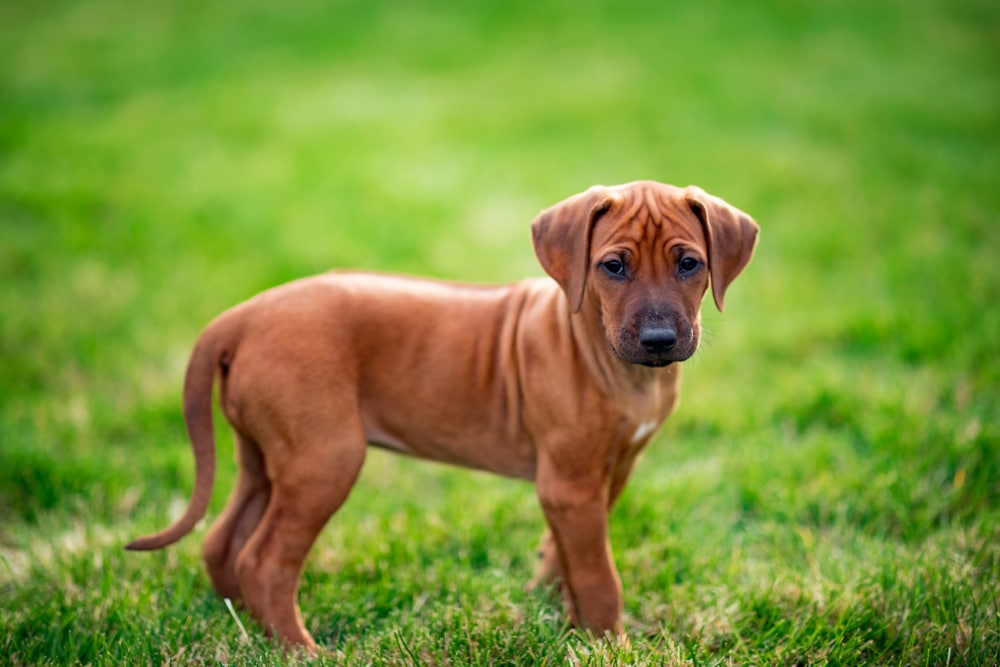
Personality
According to Rhodesian Ridgeback breeders, males tend to be more laid-back, clingy, and people-oriented than females. One breeder mentioned that males are often happy to let female Rhodesian Ridgebacks take the lead and are generally a bit easier for first-time owners than females. However, there is no guarantee when it comes to personality traits.
You could just as easily get a female Rhodesian Ridgeback that is super lovey-dovey and responsive to humans—you have to meet the individual dog to know more about their personality rather than going by generalizations alone.
Unneutered male Rhodesian Ridgebacks may become more territorial and prone to roaming if they smell a female in heat, though this isn’t breed-specific.
Training
Rhodesian Ridgebacks tend to do better with experienced dog owners because they can be a bit of a handful for well-meaning but inexperienced first-timers. They need a lot of consistency, patience, and gentle but firm leadership.
If you get a male Rhodesian Ridgeback that matches the generalization described above, they may be a little more responsive to training due to their tendency to be rather people-oriented, but, again, there is no guarantee of this.
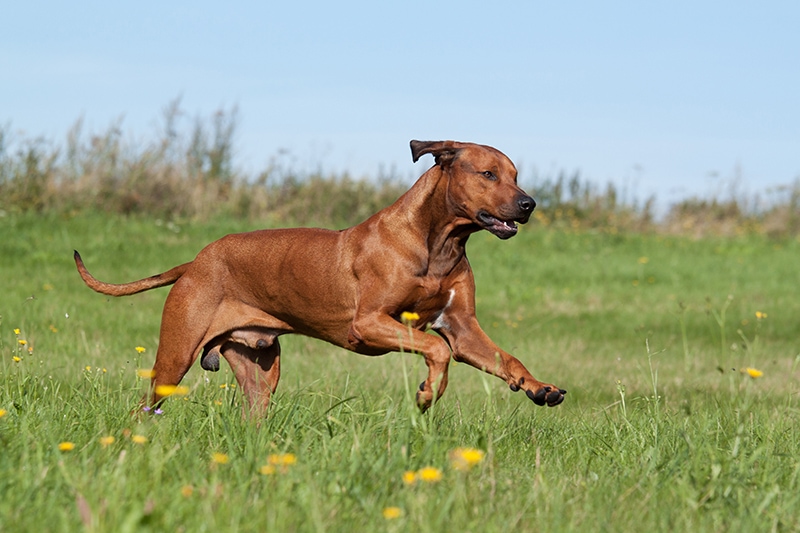
Health & Care
Though a generally healthy breed, possible health conditions that may affect Rhodesian Ridgebacks include hip and elbow dysplasia (a condition that large breeds are especially vulnerable to) and dermoid sinuses 1, which is a skin defect. Unneutered male dogs are also more at risk of testicular cancer 2 and prostate infections than males that have been neutered.
Breeding
If you buy a Rhodesian Ridgeback from a breeder, make sure you go to a reputable one that screens dogs for genetic conditions and cares about the health and well-being of the dogs they produce. Irresponsible breeding can lead to all manner of health conditions down the line, including hip and elbow dysplasia and dermoid sinuses in Rhodesian Ridgebacks.
We would recommend looking for Rhodesian Ridgebacks for adoption as an alternative to buying from a breeder.
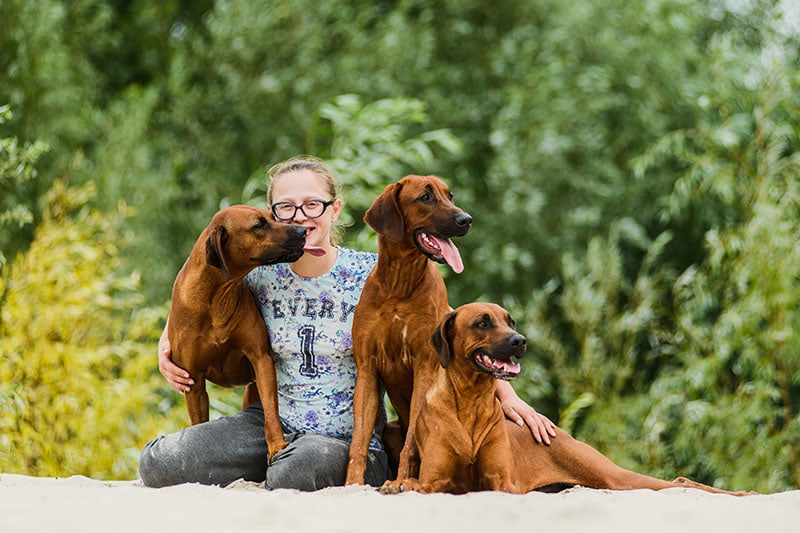
Male Rhodesian Ridgeback Pros & Cons
- Loving and affectionate with family
- Active and playful
- Gentle with children (when properly socialized)
- People-oriented
- Doesn’t shed heavily
- May be stubborn
- May be very demanding of attention (generalization)
- Can be a handful for novice owners
Female Rhodesian Ridgeback Overview
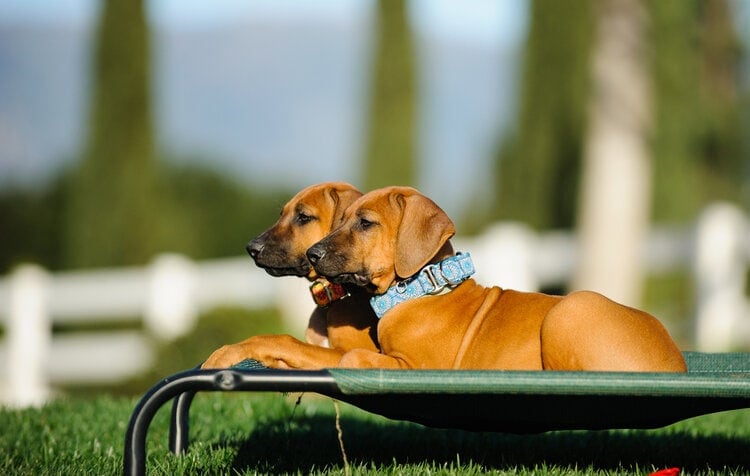
Personality
According to breeders, female Rhodesian Ridgebacks are more likely to be the leader of the pack, be less demanding of attention, and have a stronger independent streak than males.
This doesn’t mean they’re not loving—just that they may be a bit less in-your-face about it than males are. They’re also said to be more likely to alert you to something. However, again, these are just generalizations.
Training
If you get a female Rhodesian Ridgeback that closely fits the description above, they may be a bit of a challenge, especially for novice owners. That said, this is a general trait among Rhodesian Ridgebacks, both male and female, so you’re just as likely to get a wilful male.
If you’re consistent and don’t let your Rhodesian Ridgeback make the rules or be the pack leader, you should be able to get these intelligent dogs trained without too much stress. Consider obedience and socialization classes to give yourself a headstart.
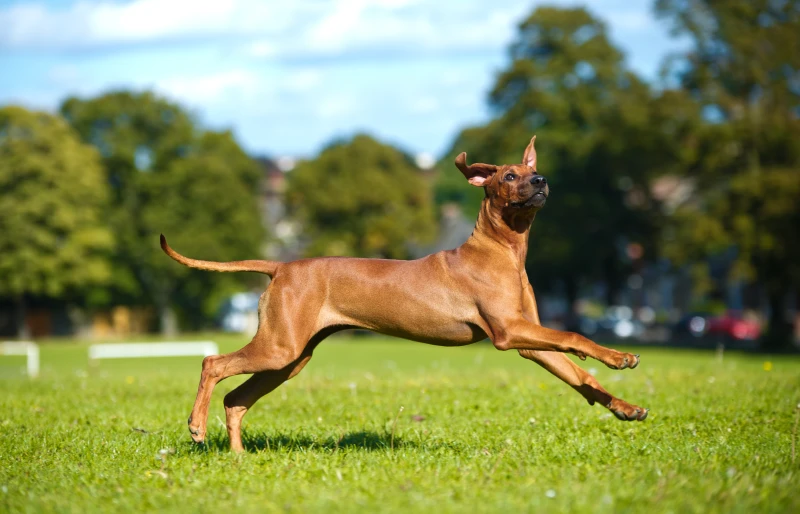
Health & Care
If your unspayed female goes into heat, you can expect her to experience some vulval bleeding. She may also become more irritable and clingy than usual, and she may urinate more often. Unspayed females are also more at risk of breast tumors 3 and uterine infections4.
The other potential health issues mentioned above in our male Rhodesian Ridgeback health section, like hip dysplasia, also apply to females.
Breeding
Female dogs may experience breeding and reproductive problems, like uterine infections, giving birth to overly large puppies, and a difficult birthing experience. Responsible and caring breeders should be aware of these issues and prepare for the possibility of them.
Consider getting your female spayed to prevent her from going into heat, being at a higher risk of certain health issues, and giving birth to unwanted puppies. Spaying and neutering also help keep the dog population under control and reduce the number of dogs that end up in shelters. Again, please consider adoption if this is a possibility for you.
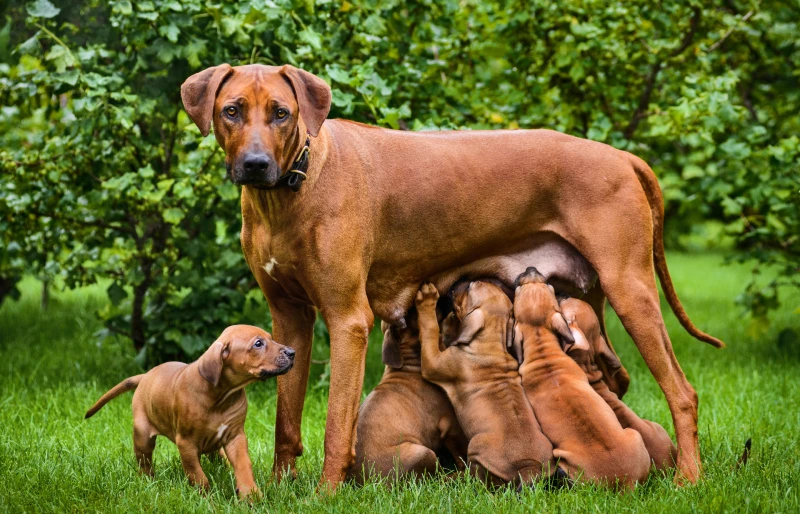
Female Rhodesian Ridgeback Pros & Cons
- Loving with family
- Great with kids (if properly socialized)
- May be less demanding than males
- Energetic and alert
- Doesn’t shed heavily
- May be less people-oriented than males (generalization)
- May be wilful
- Can be a challenge for novice owners
Which Gender Is Right for You?
Our advice is to always meet and spend time with a dog before you decide if you’re the right fit for one another. Choosing a dog based on gender generalization is not a good idea, as dogs change, develop and adapt throughout their lives, and are shaped personality-wise by a number of factors, including socialization, life experience, and genetics.
Featured Image Credit: Left – Female Rhodesian Ridgeback (Nina Quka, Pexels) | Right – Male Rhodesian Ridgeback (Marry Kolesnik, Shutterstock)



